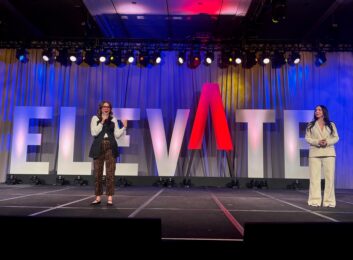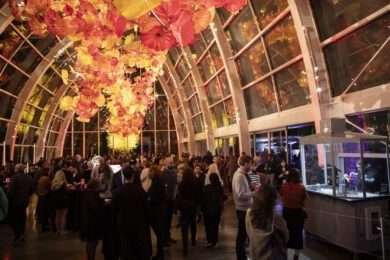Hospitality trends that will shape the meeting world in 2021 and beyond
Yes, we know the future is hybrid. But what does that mean, and what else will be different when we all crawl out from our home offices and venture back into the ballroom? Smart Meetings asked readers and others in the trenches for their vision of what they expect from the 12 months ahead. Most responded that they would probably start meeting again in 2021 (although some have already done so). And that their checklists will be even longer: They have spent the last 9 months adding virtual meeting producer, health monitor and chief bottle washer to their CV. Here is the countdown to the Great Meeting Restart.
Ready, Set, Meet
What planners say is next
The first question everyone asks on industry Zoom calls is when we are going to get back to doing what meeting professionals have trained for all their lives: bringing people together physically. 2021 was the preferred launch date for the majority of the 229 respondents to our reader survey in December.
More than 80 percent said they would be producing their first event with a physical component this year, with one in five targeting the first half of the year. Almost 8 percent said they would be waiting until 2022 or later, and the remainder said they had already brought people together again, F2F.
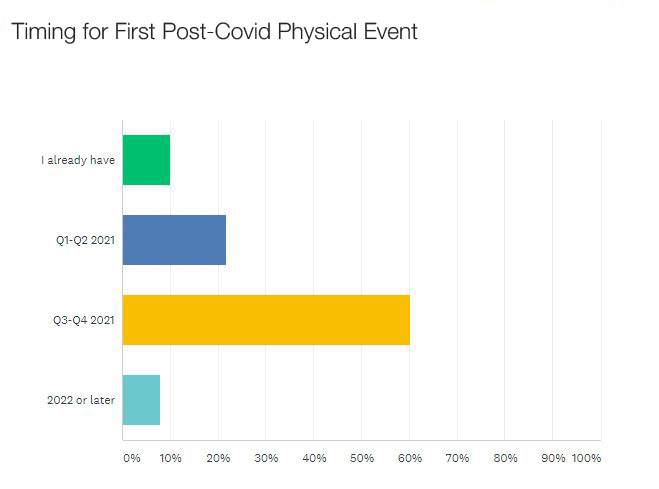
The majority of those planned events were described as hybrid (49 percent said attendance would be smaller in person but with a larger streaming audience). Yet more than 42 percent said they would be holding a traditional gathering in a venue.
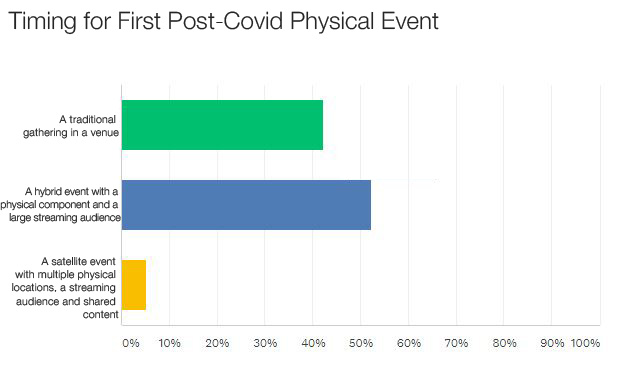
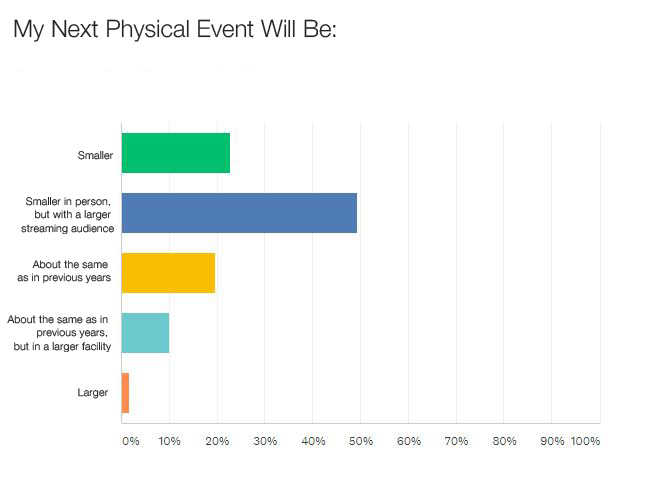
Safety was the buzzword for all these events. Almost everyone planned to include masking and social distancing in their programs. A supermajority planned to require self-evaluations and temperature checks. And more than a quarter were looking for proof of a vaccine or negative COVID-19 test from attendees.
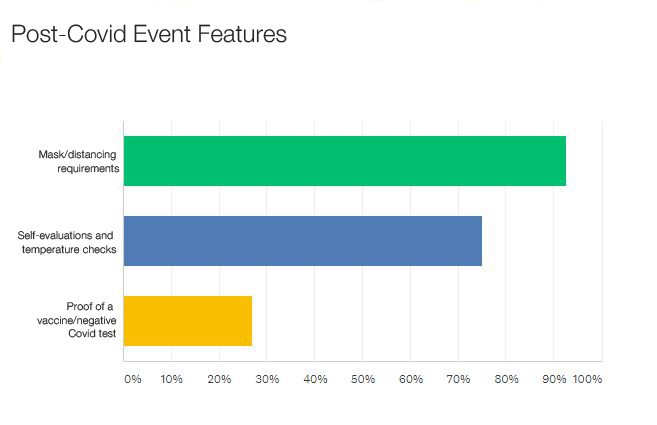
To help people feel comfortable about venturing from their safe spaces, almost all (93 percent) said they would be sharing event safety protocols in advance (35 percent as video calls to answer questions) of the event, and 71 percent said they would be surveying potential attendees to gauge their comfort levels.
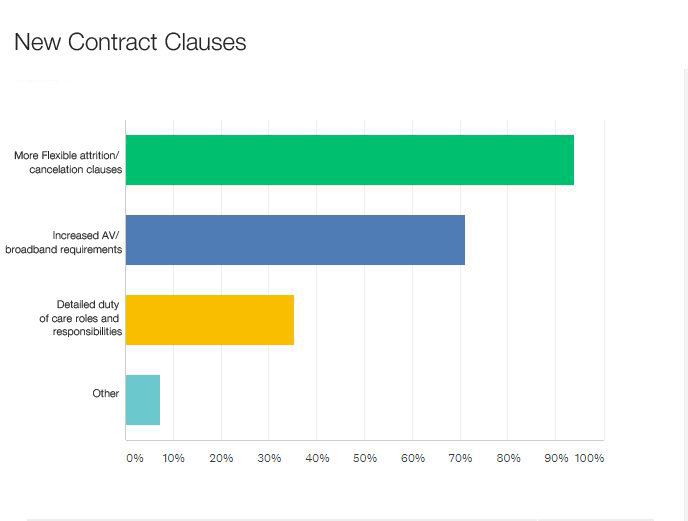
While a lot of properties have been active partners over the last year in rescheduling the rescheduled events, the majority of respondents said they were getting that in writing going forward. More than 93 percent said they were building more flexible attrition and cancellation clauses into their contracts, along with a detailed duty-of-care roles and responsibilities statement for cleaning and policing (62 percent). Force majeure clauses could be much longer and more closely scrutinized than in the past.
More than half said they are including increased AV and broadband requirements in their RFPs for those all-important hybrid components.
Another detail that became an issue may be addressed up front going forward: how deposits are handled. One respondent shared that a $500,000 deposit made a year ago still hasn’t been refunded.

Pandemic Gifts
As these Smarties prepared to hit restart on their programs, many said they were packing a number of gifts from the pandemic experience. Many cited the benefits of the COVID disruption, such as the ability to work from home commute-free and spend time with family or in the outdoors. Others pointed to all that they had learned, including virtual- and hybrid-meeting skills and certifications earned.
Some said there was no upside at all—and in light of all the devastation to the ranks of meeting professionals and hospitality partners, that is fair enough. But here a few responses that highlighted the upside.
“Enhanced ability to deal with uncertainty.”
–Maggie Kearney, meeting and publication manager, International College of Surgeons-U.S. Section
“Clean air and bigger attendance for our virtual conference.”
–Arlene Costello, president of SSTESOL of Florida
“Self-care and realizing I need more time for things and people that matter.”
–Janice Jackson, event and meeting planner, NFL Players Association
“Not having to get dressed (up) when working remotely.”
–Serena Ghering, director of marketing, PRA Events Inc.
“Being able to rescue a dog :)”
–Nicole Bansal, director of marketing, Liftoff
“Forcing us to take a hard look at the way we were doing everything.
–Kerry Kerr, senior director, global accounts, HelmsBriscoe
“Spending more time with family, with a more flexible work schedule. Learning from other event organizers and hotels on what they did to welcome groups back.”
–Angela Hogate, executive assistant, Hewlett Packard Enterprise
“I started this position when the pandemic hit. So, my first event for them was virtual. I was able to make it my own, instead of doing what they always did.”
–Melissa Fannon, events manager, OPRA
“Giving people a wake-up call and for them to stop being jaded and taking everything for granted, business- and life-wise.”
Stephanie Moss, managing director, Solutions Group Events
“Self-assessment and appreciation of my colleagues and employer.”
–Dee Walsh, meeting planner, Catholic Health Association
“Appreciation of what we took for granted.”
–Alan Jobe, executive director, Claims Prevention and Procedure Council
“Human communication and kindness.”
–Hector A. Venegas, managing director, Engaging Meetings Ltd.
“The opportunity to re-evaluate what we are doing and why.”
–Meghan Ruona, director of events, Constellation Research
“It gave us an opportunity to focus on how to put on a successful virtual event. That is something we had talked about doing for many years but never took the time to implement. The pandemic forced our hand to figure it out, and now we have another very successful tool in our toolbox.”
–Kendra Arch, marketing and events manager, Organic Valley


